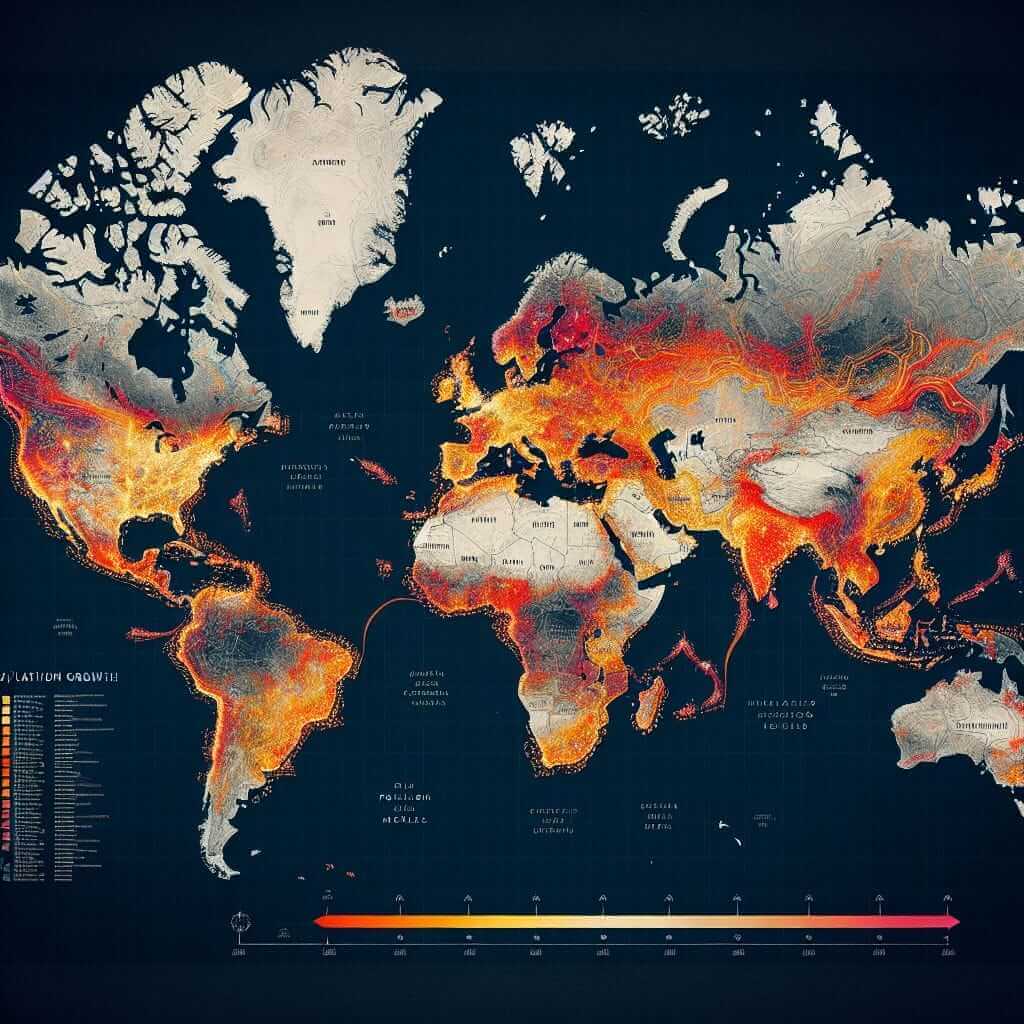The Reading section of the IELTS exam often includes passages on current global issues. One frequently discussed topic is the consequences of global population growth. This topic has appeared in various forms in past IELTS exams, reflecting its relevance and importance in today’s world. As a seasoned IELTS instructor with over 20 years of experience, I have witnessed this topic being covered multiple times. Understanding the implications of population growth and preparing for this topic can significantly enhance your reading comprehension skills and overall performance in the IELTS exam.
Reading Passage: The Consequences of Global Population Growth
Prepare for an IELTS Reading practice with a passage tailored to reflect the type of content you might encounter in the real exam. This passage falls under the “Medium Text” difficulty level and delves into the consequences of global population growth.
Reading Passage
Title: The Consequences of Global Population Growth
Over the last century, the global population has increased dramatically. This surge presents a myriad of challenges and consequences that influence various aspects of life on Earth. From environmental degradation to economic strain, the repercussions of an ever-growing populace are far-reaching and multifaceted.
Environmental Impact:
One of the most pressing consequences of global population growth is the strain on natural resources. As the population increases, the demand for water, food, and energy rises, leading to overexploitation of these resources. Deforestation, pollution, and loss of biodiversity are direct outcomes of the increased need for agricultural land and urban development. Climate change is also exacerbated by population growth, as more people contribute to higher greenhouse gas emissions.
Economic Consequences:
Another significant impact is on the global economy. While a larger workforce can potentially lead to economic growth, it also brings about heightened competition for jobs, resources, and services. Many developing countries struggle to provide adequate infrastructure, healthcare, and education to their rapidly growing populations. This can result in lower living standards and increased poverty levels.
Social and Health Issues:
Population growth also poses social and health challenges. Overcrowded cities often lead to inadequate housing and sanitation, which can cause the spread of diseases. Healthcare systems in densely populated areas may become overwhelmed, reducing their effectiveness. Additionally, rapid population growth can lead to social unrest, as resources become scarcer and inequalities more pronounced.
Questions
Multiple Choice
-
What is one major environmental consequence of global population growth?
A. Increased agricultural development
B. Enhanced biodiversity
C. Greater availability of natural resources
D. Higher greenhouse gas emissions -
Population growth can result in which economic issue?
A. Decreased competition for jobs
B. Improved infrastructure in developing countries
C. Increased economic growth without strain
D. Lower living standards and increased poverty
Identifying Information (True/False/Not Given)
-
The passage states that deforestation is a result of urban development.
True / False / Not Given -
Population growth only affects developing countries.
True / False / Not Given
Sentence Completion
- Overcrowded cities can lead to inadequate ___ and poor sanitation.
- A larger workforce may potentially ___ economic growth but could also heighten competition for jobs.
Answer Keys
Multiple Choice
- D. Higher greenhouse gas emissions
- D. Lower living standards and increased poverty
Identifying Information
- True
- False
Sentence Completion
- housing
- lead to
Analysis and Common Mistakes
When practicing such passages, students often make mistakes by skimming too quickly or misinterpreting key points. For example, in the Identifying Information questions, be careful not to confuse “Not Given” with “False.” It’s crucial to understand that “Not Given” means the information isn’t stated in the passage, while “False” means the passage directly contradicts the statement.
Vocabulary
Here are some challenging words from the passage:
- Exploitation (noun): the action of making use of and benefiting from resources.
- Exacerbated (verb): made worse.
- Infrastructure (noun): the basic physical and organizational structures needed for the operation of a society.
- Scarcer (adjective): insufficient for the demand.
Grammar Focus
Pay attention to how comparatives and superlatives are used in the passage:
- Comparative: “higher greenhouse gas emissions…”
- Example: Climate change is exacerbated by higher greenhouse gas emissions.
- Superlative: “Most pressing consequence…”
- Example: One of the most pressing consequences of global population growth is the strain on natural resources.
Advice for Practice
- Timing: Practice under timed conditions to improve your speed and efficiency.
- Skimming and Scanning: Develop skills to quickly identify main ideas and locate specific information.
- Vocabulary Building: Regularly expand your vocabulary to better understand complex texts.
- Answering Techniques: Discover strategies for different question types – such as process of elimination for multiple-choice queries.
By focusing on these areas and consistently practicing, you can increase your confidence and performance in the IELTS Reading section.

Reading widely and frequently on various IELTS topics will prepare you not only for the Reading module but also enhance your overall English language proficiency.